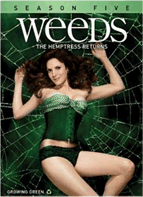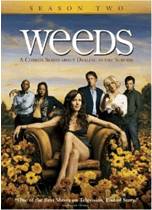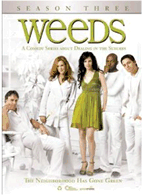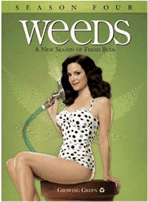Showtime series irreverently wastes the WOD __ 9/10
Reviewed by Brian Wright (originally April 2010)
 Nancy Botwin: I’m not a dealer, I’m a mother who happens to distribute illegal products through a sham bakery set up by my ethically questionable CPA and his crooked lawyer friend.
Nancy Botwin: I’m not a dealer, I’m a mother who happens to distribute illegal products through a sham bakery set up by my ethically questionable CPA and his crooked lawyer friend.
One day a few months ago, I happened to be reading Playboy—yes, it’s largely only for the articles, these days, dammit—and the video-of-the-month section featured Weeds: Season 5, showing a very sexy picture of Mary Louise Parker in a “trapped pleasure” pose per a green spider web motif. Now that’s hot.
Created by Jenji Kohan
Mary-Louise Parker … Nancy Botwin
Elizabeth Perkins … Celia Hodes
Hunter Parrish … Silas Botwin
Alexander Gould … Shane Botwin
Kevin Nealon … Doug Wilson
Justin Kirk … Andy Botwin
Allie Grant … Isabelle Hodes
Andy Milder … Dean Hodes
Romany Malco … Conrad Shepard
Tonye Patano … Heylia James
Demián Bichir … Esteban Reyes
Well, okay, so reading the blurb, this is a series on the Showtime cable channel, already in its 5th season[1], that deals with the marijuana business from an upper middle class suburban perspective. So, a satire as it were, and in its fifth season already!? I’m thinking to myself: “Why haven’t I heard of this?! Totally unacceptable… not to say that I’m leading edge on the whole entertainment industry, but on matters that threaten or expose the ruling class’s lies, I generally have a clue what’s going on. Why has this series been hiding from me for FIVE YEARS?!!!” It’s a conspiracy.
But not one to wallow excessively in ignorance, I quickly visited my Netflix queue and loaded it up with the first few seasons. Wow! The conception and writing of this show are simply brilliant… without peer: Jenji Kohan is this sort of nondescript 40-something woman who materialized out of obscurity to completely nail, not only the hypocrisy and irrationality of the War on Drugs (WOD) but, the realities of local politics, the essence of life in the upper-middle-class American suburban bubble, the whole range of American sexuality, the socioeconomy of race and immigration in Southern California, and genuine family values.
Kohan not only treats each subject honestly, sometimes brutally so, but with a pinch of tenderness and large helpings of roll-on-the-floor-laughing your-ass-off (roflyao). Her story starts, just as a tiny, tenuous, innocent budding of a cannabis plant, with young, suddenly widowed Nancy Botwin (Mary Louise Parker) coming to the reluctant conclusion that, to keep her family together and pay the rent, she must turn her marijuana habit into something more entrepreneurial. Her 40-something husband, Judah, who keeled over from a heart attack while jogging, had no insurance; Nancy has no special skills… combined with two kids—Silas (Hunter Parrish) and Shane (Alexander Gould)—and no relatives inclined to help out.
Season 1
 The Botwin family dwells in the upscale gated community outside of LA, called Agrestic. The first season explores the vagaries of what is probably a typical countereconomy business: Nancy acquires her weed supply from Heylia James (Tonye Patano) whom she met through a friend Conrad Shepard (Romany Malco). Conrad is Heylia’s nephew and does most of the actual production work; the extended Conrad-and-Heylia family hang out in the rough, mainly black and Hispanic Los Angeles’ West Adams’ district. Quite a contrast to Nancy’s affluent neighbors—including blithely sleazy city councilman Doug Wilson (Kevin Nealon)—who eagerly scarf up what Nancy is selling.
The Botwin family dwells in the upscale gated community outside of LA, called Agrestic. The first season explores the vagaries of what is probably a typical countereconomy business: Nancy acquires her weed supply from Heylia James (Tonye Patano) whom she met through a friend Conrad Shepard (Romany Malco). Conrad is Heylia’s nephew and does most of the actual production work; the extended Conrad-and-Heylia family hang out in the rough, mainly black and Hispanic Los Angeles’ West Adams’ district. Quite a contrast to Nancy’s affluent neighbors—including blithely sleazy city councilman Doug Wilson (Kevin Nealon)—who eagerly scarf up what Nancy is selling.
We also meet Nancy’s friend, Celia Hodes (Elizabeth Perkins), who when she’s not feeling insecure or cheated by life acts out her frustrations on her ethically loose lawyer-husband Dean (Andy Milder) and on her obese 11-year-old daughter Isabelle. Though Nancy is supplying Dean and other leading members of the Agrestic community, Celia initially doesn’t suspect any of this… and tends to want Nancy to be her friend.
Then there are the Botwin boys themselves: Shane, the younger of the boys, was jogging with his father when his father died; he sort of freaks out and does strange things. The older boy, Silas, is a less introverted and more attractive teenager, and spends most of his time worrying about where and how to have sex with his several girl friends. Another Botwin “boy” is Andy (Justin Kirk), Judah’s brother, Nancy’s brother-in-law, who one day just shows up at the Botwin trophy home. Andy is a rogue and a rascal, but one with a good heart; he becomes almost as central a character as Nancy herself.
Season 2
While the first season is primarily comedic, the second brings in more dangerous elements of the harsh reality of an illegal market. Discovering that legal-marijuana facilities in the state of California produce high grade products that put her own cheap bud to shame, she helps Conrad branch off from Heylia to produce a superior strain—it stimulates deep meditation and thought—that the (real) Snoop Dogg dubs “MILFweed.” Nancy is now tapping into some serious gangsta markets, bringing in a lot of cash but also some competitive danger. This is the season, too, when she inadvertently meets Mr. DEA agent.
 Season 2 is my favorite so far because it contains the greatest number of plot elements, retains its humor angle, and introduces a menagerie of characters who present vast opportunities for penetrating irregular human behavior. The second year is also set around the ‘little boxes’ community of Agrestic, as in complete contrast to what normal people do with their lives. Finally, you’ll notice that Jenji Kohan uses Weeds to delve into, in amazing detail, all kinds of sexual behavior short of bestiality… and I don’t honestly remember whether she gets around to that in later seasons. Anyway, Weeds is definitely extremely R-rated, something you won’t want to watch with your parent(s).
Season 2 is my favorite so far because it contains the greatest number of plot elements, retains its humor angle, and introduces a menagerie of characters who present vast opportunities for penetrating irregular human behavior. The second year is also set around the ‘little boxes’ community of Agrestic, as in complete contrast to what normal people do with their lives. Finally, you’ll notice that Jenji Kohan uses Weeds to delve into, in amazing detail, all kinds of sexual behavior short of bestiality… and I don’t honestly remember whether she gets around to that in later seasons. Anyway, Weeds is definitely extremely R-rated, something you won’t want to watch with your parent(s).
Seasons 3 and 4
 Still highly entertaining, with award-winning writing and dialog, the series in Season 3 begins a slow descent toward the Dark Side… of just about everything: relationships, the drug business, immigration, race, city government, social conformity, schooling, family, what have you. Yes, I’d have to say the comedy, too, becomes darker. The black drug warlords, notably one “U-Turn,” become a serious menace basically holding Nancy in bondage through threats to her precious boys. At times you wonder how in the heck will she ever get out of this mess, and “Is it really worth it to follow the lure of easy money by entering an illegal market where, because the returns are so extraordinary, serious criminals who will hurt you abound?”
Still highly entertaining, with award-winning writing and dialog, the series in Season 3 begins a slow descent toward the Dark Side… of just about everything: relationships, the drug business, immigration, race, city government, social conformity, schooling, family, what have you. Yes, I’d have to say the comedy, too, becomes darker. The black drug warlords, notably one “U-Turn,” become a serious menace basically holding Nancy in bondage through threats to her precious boys. At times you wonder how in the heck will she ever get out of this mess, and “Is it really worth it to follow the lure of easy money by entering an illegal market where, because the returns are so extraordinary, serious criminals who will hurt you abound?”
Who is to say? What we do notice is the growth psychologically of Nancy, because through it all she becomes a survivor, someone you do not want to mess with. She always winds up on top, through smarts or her friends or just luck. Also, Andy comes along to rise above his earlier rogue orientation. Always the ladies’ man, Andy comes to a point where he sees Nancy as potential romance… the real thing, too. Not only is Andy’s character the most interesting in the series—a cross between Errol Flynn and Casanova—he’s constantly exploring new ideas and ways to get by in style. He’s also a big-hearted father figure to Nancy’s kids.
 With Doug, Andy contributes multiple jaunts of pure roflyao humor… even through the dark times. As Season 4 rolls, we find the writers and director looking at immigration with a satirical eye. Because of a fire in Agrestic, which destroys their uninsured home and a primo crop of MILF weed, the Botwins have to move. Nancy pays a call to Judah’s and Andy’s father, played by Albert Brooks, a sleazy bettor-loser living near the ocean in a fictional town of Ren Mar. Ren Mar is close to the San Diego/Tijuana border and some new illegal market opportunities open up—moving people without government permission—even as Nancy is trying to go semi-straight.
With Doug, Andy contributes multiple jaunts of pure roflyao humor… even through the dark times. As Season 4 rolls, we find the writers and director looking at immigration with a satirical eye. Because of a fire in Agrestic, which destroys their uninsured home and a primo crop of MILF weed, the Botwins have to move. Nancy pays a call to Judah’s and Andy’s father, played by Albert Brooks, a sleazy bettor-loser living near the ocean in a fictional town of Ren Mar. Ren Mar is close to the San Diego/Tijuana border and some new illegal market opportunities open up—moving people without government permission—even as Nancy is trying to go semi-straight.
Toward the end of Season 4, Nancy meets the handsome mayor of Tijuana, Esteban Reyes (Demián Bichir), who also happens to run the majority of the drug and illegals’ business from the Mexican side.
Season 5
Esteban is the quintessential kingpin—a Tony Soprano without the beer gut and the wise-guy patois. He is quite cultured and good natured, only ruthless when it comes to business. He has reason to want to end Nancy’s days on Earth, instead for reasons that I do not wish to spoil for you—you guessed it—he falls head over heels in lust/love with Nancy, as does she, him. The pairing makes for a number of awkward moments,  some jealousies from Andy and Conrad (still in the picture from a long-range relationship standpoint, but I doubt they exchange Christmas cards). Also Silas and Shane, are growing older now—especially Silas who attracts virtually any girl or ‘coyote’ within a 50-foot radius—approaching adulthood. [That’s one interesting feature of a miniseries starting with children that extends several years: they grow up fast.] They come to form strong opinions regarding their mother and her ways. They will be heard.
some jealousies from Andy and Conrad (still in the picture from a long-range relationship standpoint, but I doubt they exchange Christmas cards). Also Silas and Shane, are growing older now—especially Silas who attracts virtually any girl or ‘coyote’ within a 50-foot radius—approaching adulthood. [That’s one interesting feature of a miniseries starting with children that extends several years: they grow up fast.] They come to form strong opinions regarding their mother and her ways. They will be heard.
So will Nancy once again be part of a normal, Southern California marijuana alternative economy? What about Esteban? What about the bitch from hell, Pilar, Esteban’s pretty little image dictator who controls all his political life and his personal life, too. She despises Nancy. And what’s Andy up to?
Okay, so Season 5 is not my favorite year. Frankly, it’s a bit grueling with the language and the explicit—sometimes unsettling—sexual themes. Also the violence and threat thereof [for example, the series practically duplicates the drug war shootings and mayhem in Mexico that are actually happening right now because of the WOD]; it’s almost too  documentary. Are we losing the innocence and humor that made Nancy Botwin such an interesting, sexy woman? In any case, I can’t wait for Season 6. This is a smart, timely, passionately cared-for creation. Unforgettable.
documentary. Are we losing the innocence and humor that made Nancy Botwin such an interesting, sexy woman? In any case, I can’t wait for Season 6. This is a smart, timely, passionately cared-for creation. Unforgettable.
[1] Sixth season coming up in August 2010.
This post has been read 2879 times!


